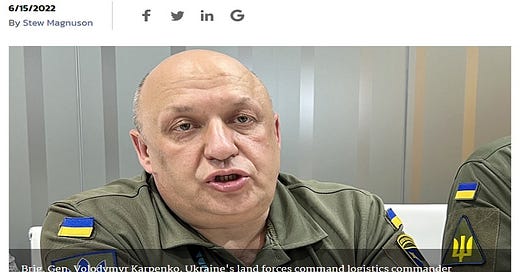Kiev’s Military Officials Shared Some Intriguing Details About NATO’s Proxy War On Russia
Kiev finally acknowledged that it can’t sustain its staggeringly high attrition rate in the face of Russia’s ongoing special military operation. It’s also becoming concerned that it can no longer rely on its Western partners like before, some of which are losing interest in supplying it in light of recent on-the-ground developments in the Battle for Donbass.
Denys Sharapov and Volodymyr Karpenko, Kiev’s Deputy Minister of Defense in charge of procurement and its land forces command logistics commander respectively, gave a detailed interview to the National Defense magazine on the sidelines of last week’s Eurosatory conference in Paris. That outlet reaches 1,800 corporate members of the US’ military-industrial complex (MIC) by its own admission, thus making it one of the most influential information sources in that line of work. Their interview with those two officials is worth reading because it contains a lot of facts about NATO’s proxy war on Russia through Ukraine and the role of the MIC within it, which the present piece will summarize.
Here's the most important information from the interview:
* The Russian-Ukrainian Frontline Is Jaw-Droppingly Long:
- “You have to understand that the frontline is 2,500 kilometers long. The frontline where there is active combat in more than 1,000 kilometers long. That’s like from Kyiv to Berlin.”
* Only A Fraction Of Kiev’s Military Needs Are Currently Being Met By The West:
- “We have received a large number of weapon systems, but unfortunately with such a massively expendable resource, it only covers 10 to 15 percent of our needs.”
* Kiev Already Lost A Staggeringly High Ratio Of Its Total Military Equipment:
- “As of today, we have approximately 30 to 40, sometimes up to 50 percent of losses of equipment as a result of active combat. So, we have lost approximately 50 percent. … Approximately 1,300 infantry fighting vehicles have been lost, 400 tanks, 700 artillery systems.”
* Drones & Rocket Launchers Are Regarded As Game-Changers By Kievt:
- “If we can use long-range items like the drones — like the MLRS — that will allow us to extend the effective range up to 60 kilometers, that will give us the upper hand and that will give us significant success.”
* Arms Sales Are Inherently Political:
- “You should understand that any weapon transfer is always a political decision. And very often, it's not up to the government of one country. There are different alliances.”
* Some Countries Are Losing Interest In Arming Kiev:
- “And the other component is that, unfortunately, not all politicians understand the gravity of what is going on in Ukraine. Some people believe that this is not their war. This war is so far away it doesn’t concern them.
* Kiev’s Arms Consumption Rate Is So High That Only Global MIC Coordination Can Satisfy It:
- “I'll have you know that there is not a single manufacturer or supplier that is able to keep up — only all together [can they keep up]. It has to be a joint effort because there's not a single supplier that is able to do that single handedly.”
* Ukraine Is Now The World’s Top Arms Market:
- “Over these last three days we've been asking everybody to join this effort together to come together because once again, quite unfortunately for us, we have become the biggest consumer of weapons and ammunition in the world.”
* Russian Artillery Is Successfully Taking Out Ukraine’s Western Artillery:
- “The M777 artillery systems are really prone to being damaged by enemy artillery. For every battery of M777, there are six pieces. After every artillery contact, we have to take two artillery pieces and take them back to the rear to maintain them because some of the subsystems are damaged by shrapnel. This happens every day.”
* Kiev’s Worried That Some Western Governments Won’t Greenlight Its Arms Requests:
- “We have a very difficult task at hand for us. For those companies, we ask them to arrange weapons supplies for us as quickly and as efficiently as possible. We really expect that the governments we're cooperating with will fully support their weapons factories in support of Ukraine.”
A few words will now be said about the details that were just shared above.
Kiev finally acknowledged that it can’t sustain its staggeringly high attrition rate in the face of Russia’s ongoing special military operation. It’s also becoming concerned that it can no longer rely on its Western partners like before, some of which are losing interest in supplying it in light of recent on-the-ground developments in the Battle for Donbass. None of these observations are so-called “Russian propaganda” but are openly admitted by Kiev’s own military officials, which confirms that the “official narrative” towards the conflict has decisively shifted in recent weeks. Seeing as how the global MIC coordination that Kiev requires to win is impossible, it should therefore be taken for granted that its loss is inevitable.




